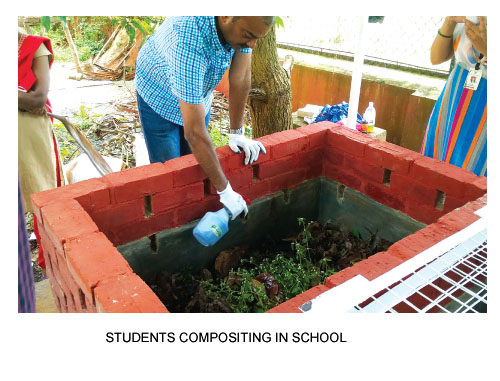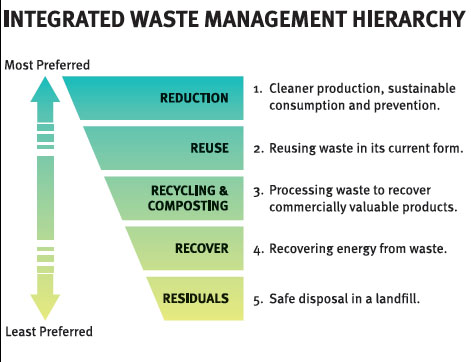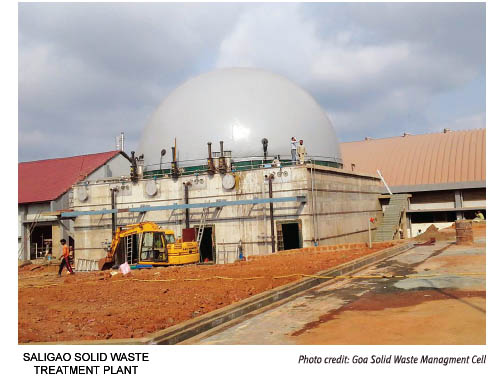Solid waste management in Goa: The way forward
INTRODUCTION
Poor waste management can affect not just the aesthetic beauty of the environment, but can severely impact 'a valuable resource base', its ecological functions and thus, the health of the environment. With the rise in population, both residential and floating, and the consequent increase in waste generation, the problem will only get compounded in the years to come. This thus calls for effective waste management practices to be followed at all levels across the state.
The Government recently notified the new Solid Waste Management Rules 2016 replacing the Municipal Solid Waste (Management and Handling) Rules of 2000. These rules are now applicable beyond municipal areas to include urban agglomerations, census towns, notified industrial townships, areas under the control of Indian Railways, airports, airbase, port and harbour, defence establishments, special economic zones, State and Central government organizations, places of pilgrims, religious & historical importance as well. The new rules also empower local urban bodies to charge for waste collection and disposal along with spot fines for littering.
As a waste generator, it is important to prioritize waste reduction at source as the first best practice option available. The well-established waste management principles strongly advocate waste minimization as the first step as it drastically reduces the amount of resources and infrastructure needed in the whole waste management process. Door-to-door collection systems should be put into place so as to collect segregated waste and avoid any waste especially mixed waste going into common waste receptors. The next best option in the waste management hierarchy is 'segregation at source'. This is strongly encouraged as it retains waste in its best form possible and thus helps in achieving optimum composting and recycling rates. Decentralized (and centralized, where not possible) composting should be undertaken to recycle the biodegradable component into manure. This will divert at least 40-50% of the total waste being sent for disposal and therefore shrink all related operational costs.
On 30 May 2016, Goa's 30th Statehood Day, a Solid Waste Treatment Plant (with a total capacity of 100 tonnes per day) was inaugurated at Saligao. The plant has been planned as a state-of-the-art modern facility based on mechanical biological treatment (MBt) process with proper segregation, recovery of recyclables and bio-methanation process. It thus has three major components: a material segregation and recycling center, bio methanation and composting section, and a scientific secured landfill. Considering the plant has been in operation only for a few months, a fair evaluation of its performance can be done only after a sustained period of time.
As per the Municipal Solid Waste Annual Report (2014-2015) of Goa State Pollution Control Board (GSPCB) not a single town had adhered completely(ioo%) to the Municipal Solid Waste (Management and Handling) Rules of 2000, with only 12 municipal bodies having 'partially complied'. The report however states that Panaji, Pernem, Bicholim, Valpoi, Ponda, Mapusa, Quepem and Cuncolim have been able to set up good initiatives in different areas of waste management, but a lot needs to be done by each one of us to save our beautiful state, and the faster we all take action as responsible citizens - the better it will be.



In a landmark ruling, the state of Goa notified 'The Goa Non-Biodegradable Garbage (control) act, 1996 and rules 1997'. This act mandates local bodies like Municipalities and Panchayats to collect and dispose off the solid waste generated in Goa. It provides a comprehensive legal framework to collect, manage, treat and dispose both biodegradable as well as non-biodegradable waste in a scientific manner.
WHAT CAN YOU DO
- PRE-CYCLE minimize consumption and reduce waste generation in the first place!
- SEGREGATE separate the biodegradable component (wet) from the non-biodegradable component (dry) to divert 40-50% of your waste entering into the garbage stream.
- COMPOST the wet waste and derive high quality manure and improve soil fertility.
- REUSE & RECYCLE reuse whatever you can before junking it. Further, try and recycle the same product into a newer one once it has exhausted its life.

